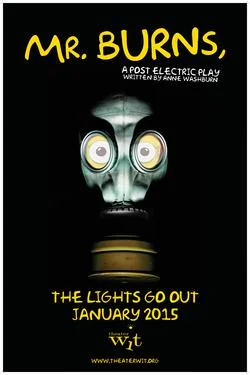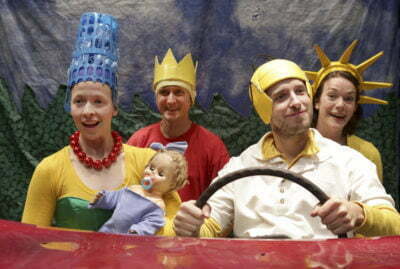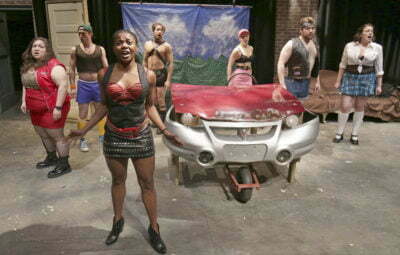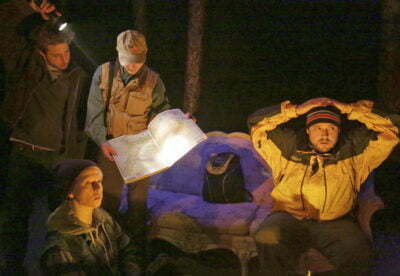Mr. Burns, a Post-Electric Play
By Anne Washburn
Directed by Jeremy Wechsler
Produced by Theater Wit
Excellent Mr. Burns Gets Better With Time
Will remote posterity say Matt Groening was our Euripides? Playwright Anne Washburn imagines they will. Set following an inexplicable nuclear holocaust that reduces America to a dark age, Mr. Burns depicts the afterlife of our pop culture, and particularly Cape Feare, a 1993 episode of The Simpsons. The play is long, and director Jeremy Wechsler’s decision to include two intermissions is a dangerous gamble, because the third act is by far the best. Part of the reason it works so well is how the first two acts lay the groundwork by clearly summarizing the major themes of our shared experience Washburn is concerned with, but the audience must trust this is going somewhere, and has plenty of chances to leave.
The first act takes place in the near future, when a ragged group of survivors huddle around a campfire in the post-apocalyptic world. Nobody really understands what went wrong, or what happened to everybody. In between exchanging the names of people they’re seeking information about, this particular group is amusing themselves by recounting Cape Feare. Or, at least, Matt (Daniel Desmarais) and Jenny (Leah Urzendowski) are recounting the story to Maria (Christina Hall). In it, Bart’s nemesis Sideshow Bob stalked the Simpsons and captured them on a houseboat. The episode was a parody of Cape Fear, and also included lots of Gilbert and Sullivan references. Maria confuses Sideshow Bob with Mr. Burns, another Simpsons villain who owned the nuclear power plant, and is therefore also relevant to their situation. What is clear, however, is that for those who knew The Simpsons, recounting it as accurately as possible is great solace, a way of creating the familiar in a chaotic world. And chaotic it is, because from what we learn through rumor, the survivors are plundering and massacring each other. Wechsler creates an atmosphere of paranoia, but we see the characters slowly learning to rely on each other.
The second act takes place seven years later, when the group has formed a theatre troupe to put on revivals of The Simpsons episodes, along with commercials and music videos. Why commercials? Because they remind people of a time of plenty, and were a shared experience that still connects them in a time of suspicion. The itinerant company faces problems similar to those faced by the first acting troupes in America: vulnerability to bandits, the rivalry of another group with greater resources, rudimentary performance spaces. Theatre people will enjoy seeing Hannah Gomez as a stage manager who open-carries. But there’s also the issue that patrons demand accuracy, and sell their recollection of lines to the company. The murkiness of ownership creates ugly tensions that quickly become dangerous. This act, which includes plays within the play, most clearly articulates the ideas that went into the show.
But it’s the third act, seventy years later and long after anyone who remembers the source material is gone, that those ideas get put into practice. I don’t want to give it away and would have a hard time describing it even if I wanted to, but it is entirely musical and displays melodrama at its manipulative best. In that distant world where our pop culture has joined the classics, Cape Feare has become so distorted and embellished it bears little resemblance to the original. Mr. Burns has replaced Sideshow Bob, and there are lots of other callbacks to the fragments we saw weave their way into the narrative in the final play-within-the-play. It’s hilarious how things have been misinterpreted, but also moving how the future people saw deeper themes in what we viewed as disposable entertainment that they could apply to their own lives. It’s also much darker for a ruined world: there’s a bloodbath, yet defiantly hopeful.
The third act also gives the actors a better chance to show off their singing. Leslie Ann Sheppard, as Bart, is the archetypical young hero, and as such the stand-in for everybody’s aspirations and fears. Andrew Jessop, as Mr. Burns, is a maniacal supervillain, and his battle with Sheppard takes on mythical proportions. Really, all the actors are wonderful. They move from realism in the first act that is humorous for their incoherent dialogue, to including more stylized performances in the second act, and finally becoming something superhuman in the third.
Aiding their transformation is an array of design that, again, only really stretches itself in the third act. Mara Blumenfeld and Mieka Van Der Ploeg’s costume pieces include parts that look like Simpsons characters’ bodies—yellow skin, overbites. Joe Schermoly’s design of the houseboat keeps the post-apocalyptic theme in a world that is starting to re-establish itself, but his understated woods in Act I were effective, too. Don’t forget to examine the images surrounding the proscenium. Geoff Coates’s fight choreography made the final battle between good and evil great fun.
I was born after The Simpsons finished its third season, so the idea of the franchise being eternal is not outlandish to me. It is reality. I became annoyed when the characters paraphrased lines while trying to piece the episodes together, and wanted to join in their debate over what was more accurate. It matters, dammit! For Wechsler, using them as a starting point to talk about the comfort of storytelling clearly also comes naturally, because the production is deeply sincere in its fascination with how common touchstones become eternal and universal. Watching this show requires patience. The first two acts serve a purpose that cannot be fully appreciated until the third. Be open to the experience, and you’ll leave thinking “your ideas are intriguing to me and I wish to subscribe to your season.”
Highly Recommended
Jacob Davis
Reviewed January 19, 2015
For more information, see Mr. Burns, a Post-Electric Play’s page on Theatre in Chicago.
Playing at Theater Wit, 1229 West Belmont Ave. For tickets, call 773-975-8150 or visit TheaterWit.org. Tickets are $25-70. Runs Thursday-Saturday at 7:30 pm except January 22 and 29, Sunday at 2:00 pm through March 1. Running time is two and a half hours with two intermissions.



